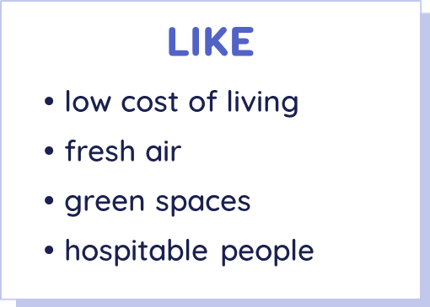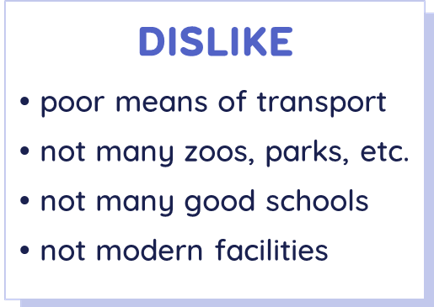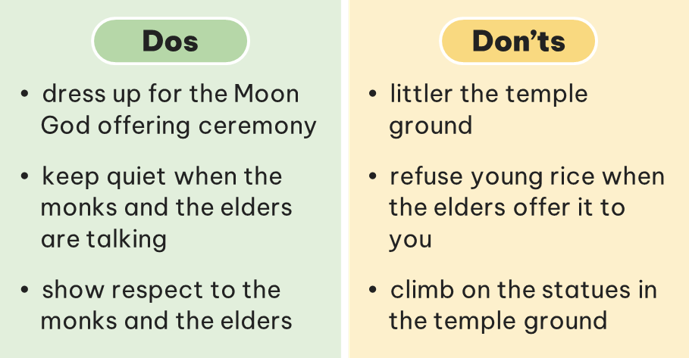Hãy nhập câu hỏi của bạn vào đây, nếu là tài khoản VIP, bạn sẽ được ưu tiên trả lời.

Living in the countryside is very unique. Although many people think that the country is not good or not well-provided, it's still one of the best options for healthy living. In the countryside, first, it's the low cost of living. Secondly, unlike the cities, the country provides fresh air and green spaces. Last but not least, the villagers are always kind and friendly, willing to help each other no matter what.
Some people really prefer to live in the downtown because of its facilities. But I prefer to live in the countryside because of many reasons.
First of all, the life in the city makes me uncomfortable, I cannot bear to live in cramped conditions with the hustles and bustles. We do not have fresh air to breathe, do not have a space for our children to play and for us to relax. It is really tiring and upset to wait for hours because of traffic jams.
Secondly, the pollution because of smogs and dusts and noise can make me feel sick. Moreover, I do not feel safe to live in the city because the criminal situations are rising. , We feel worried when we go out each time.
Thirdly, Nowadays, the conditions of the countryside are better and better, the gap between the cities and the countryside is narrowed day by day.
I love the silence, I love fresh air. I love the good relationships of people. so I love to live in countryside.

Hùng King is a traditional festival in my country. It takes place on the tenth March every year, at Hi Cương area, Việt Trì town, Phú Thọ province. At this festival, the ticket cost is free for children whose tall is under 1m and 100,000 VND for everyone. You can join traditional competitions, eat traditional food or watch performance about Hùng King.
Hùng King is a traditional festival in my country. It takes place on the tenth March every year, at Hi Cương area, Việt Trì town, Phú Thọ province. At this festival, the ticket cost is free for children whose tall is under 1m and 100,000 VND for everyone. You can join traditional competitions, eat traditional food or watch performance about Hùng King.

Describe the picture and give a presentation about the job. You can use the questions below as guidance.
1. Where is the scene?
In hospital
2. How many people are there?
There are 2 people
3. What are their jobs?
They are doctors
4. What are they doing?
( câu này thì e k bt ạ :(( )
5. What would you to be in the future?
I would to be a gamer in the future
6. Would you to be a scientist? Why or why not?
sót 1 câu ạ:(
6. Would you to be a scientist? Why or why not?
I wouldn't to be a scientist . Because i don't biological and chemistry

BN KIÊN NHẪN NHỈ ???
Read the text about Alexander Graham Bell and do the tasks:
Alexander Graham Bell is widely known as inventor of the first telephone. He was born on March 3rd, 1847 in Edinburgh, Scotland. When he was 23, Bell emigrated to Canada with his parents and the next year moved th the United States to teach deaf-mute children. With his colleague Thomas Watson, Bell worked very hard on the experimentation to invent devices such as the harmonic telegraph ( used to send multiple messages over a single wire) and phonautograph ( used to draw the shape of the sound waves). The first telephone communication was said to have happened between Bell and Watson in 1876 while Bell was at one end of the line, and Watson worked on the telephone in other room. The first transmitted words were, " Mr Watson, come here. I want to see you"
a. Decide if the statements are T or F
1. Alexander Graham Bell is Scottish /T/
2. He spent all his life in Canada /F/
3. He worked with the deaf when he moved to the USA /T/
4. He wanted to create a device that can transmit human voice /T/
5. He was able to succeed right from the first experiment /F/
6. He worked on his inventions all by himself /F/
b. Answer the questions
1. What is Bell 's "harmonic telegraph"?
It's used to send multiple messages over a single wire
2. What is Bell 's "phonautograph"?
It's used to draw shape of the sound waves
3. When did the first communication over happened and how did it happen?
.... ( mk chịu )

1. You are in the theater and you want to take a seat. You say to the other person :
Do you mind if I take a seat ?
2. You are at someone's house and you want to use his telephone. You say to him :
Would you mind if I used your telephone ?
3. You want to borrow this book. You say to the owner of the book :
Would you mind if I borrowed your book ?
4. You want to stay for a few days at your friend's house. You say to him :
Do you mind if I stay for a few days at your house ?
5. You want to have a look at your friend's photo album. You say to her :
Would you mind if I have a looked at your photo album ?
6. You want to ask the teacher some questions. You say to her :
Would you mind if I asked you some questions ?
7. You want to turn on the radio. You say to your roommate
Do you mind if I turn on the radio ?
8. You want to use your friend's computer for a while. You say to him:
Do you mind if I use your computer for a while ?
9. You want to read someone's magazine. You say to him :
Would you mind if I read your magazine ?
10. You want to use your friend's toilet. You say to her :
Do you mind if I use your toilet ?

Hi Tom,
I hope this email finds you well. I wanted to share an exciting opportunity with you – the upcoming Ok Om Bok Festival! It's a vibrant and culturally rich event that celebrates the traditional harvest season.
Participating in the festival will give you a chance to immerse yourself in the local culture, witness mesmerizing rituals, and enjoy delicious traditional foods. The festival's colorful atmosphere and warm community spirit make it a unique experience.
Don't miss out on this fantastic cultural celebration! Your presence would undoubtedly add to the festive cheer. Looking forward to seeing you there!
Best regards,
Xuan Thanh
Dear Tom,
I'm happy to hear that you are going to join the Ok Om Bok Festival in Soc Trang Province. As I know, Ok Om Bok Festival, also called Moon Offering Festival is traditional folk festival has existed for a very long time of Khmer people in Mekong Delta, especially 2 Tra Vinh and Soc Trang Provinces.
Here, I have some advice for you to dos and don'ts at that festival. First, I think you should wear trainer or shoes and comfortable clothes because maybe you must be walk a lot. And then, remember to bring some bottle of water, it will be hot in Soc Trang so you will get thirsty.
Also, I should remind you that you must not to litter on the ground or run away from your father. It's an big festival so it will be crowded, you should be careful to not get lost. Anyway, I hope you will have a great time with your dad and enjoy the festival.
Cheers
I. Nội qui tham gia "Giúp tôi giải toán"
1. Không đưa câu hỏi linh tinh lên diễn đàn, chỉ đưa các bài mà mình không giải được hoặc các câu hỏi hay lên diễn đàn;
2. Không trả lời linh tinh, không phù hợp với nội dung câu hỏi trên diễn đàn.
3. Không "Đúng" vào các câu trả lời linh tinh nhằm gian lận điểm hỏi đáp.
Các bạn vi phạm 3 điều trên sẽ bị giáo viên của Online Math trừ hết điểm hỏi đáp, có thể bị khóa tài khoản hoặc bị cấm vĩnh viễn không đăng nhập vào trang web.
1, tìm lỗi sai và sửa lại
1, it took me a very long time recovering=>to recover from the shock of her death.
2, remember taking=>to take off your shoes when you are in a japanese house.
3, my parents permitted me going=>to go out at weekends.
4,money is used to=>for buying food and clothes.
5, he often lets me to use=>use his mobile phone.

1)recovering...to recover
2)taking...to take
3)going...to go
4)buying..buy
5)to use...use
Đúng 100% nhé
1, recovering - to recover
2, taking - to take
3, going - to go
4, buying - buy
5, to use - use
k mk nha

Exercise 1. Underline the most suitable future form in each sentences.
Why are you going to buy / will you buy a new mountain bike?
Don’t phone between 8.00 and 9.00. I’ll study / I’ll been studying then.
Look out! That tree will / is going to fall.
Let me know as soon as Louis will get / gets here.
Great news! Jean and Chris will come/ are coming to stay with us.
According to this timetable, the bus is going to arrive/ arrives at 6.00.
Can you call me at this evening, because I’ll / I’m leaving tomorrow.
If you arrive late at the sale, the best thing will go / will have gone.
Exercise 2. Put each verb in brackets into a suitable future form.
By the time we reach home, the rain will have stopped (stop).
This time next week I (lie) will be lying on the beach in Spain.
In ten years’ time I (work). will be working for a different company.
If we don’t get there by 6.00, Jack (leave) will leave
In July they (be married). will have been married for 20 years.
In the year 2500 a lot of people (live) will be living on the Moon.
When you get to the station, I (wait) will be waiting for you outside.
Don’t worried! The plane (land) will be landing/ will land/ is going to land in a moment.
By the time you come home, I (finish) will have finished. the decorating.
Come round between 8 and 9. We (watch). will be watching the match on TV then.
Exercise 3. Put each verb in brackets into a suitable future form.
When I (see) see you tomorrow, I (tell) will tell you my news.
As soon as we (get) get there, we (phone) will phone for a taxi.
I (go) will go to the library before I (do) do the shopping.
We (wait) will wait here until the rain (stop) stops
I (get) will get. £50 from the bank when it (open) open
After you (take) take the medicine, you (feel) will feel better.
You have to stay until you (finish) have finished your work.
I (let) will let you know the minute I (hear) hear the results.
Before we (paint) paint the wall, we (have).will have a cup of tea.
We (climb) will climb over the wall as soon as it (get) gets dark.
Exercise 4. Put each verb in brackets into a suitable future form.
Have you ever wondered what exactly (1) you will be doing (you do) in ten years time? Well, according to the computer expert Tom Vincent, computer (2) will be soon able (soon be able) to make accurate predictions about the future. Professor Vincent, from Cambridge,(3) will hold (hold) a press conference next week to describe the computer which he calls “the Computafuture”. “This computer can tell us what life(4) will be (be) , based on data describing last events”, explains Professor Vincent. For example, Computafuture can predict how many people(5) will live (live) in a parular area, or whether there(6) will be (be) a lot of rain during a parular period. Professor Vincent also believes that by the year 2050, computer (7) will have replaced (replace) teachers, and (8) will also be doing (also do) most of the jobs now being done by the police. “Computer are becoming intelligent all the time”, says Professor Vincent. Soon they (9) will be directing .(direct) traffic and(10) teaching (teach) our children. And telling us about the future.”





1. It happened on December 24th last year at my sister's house.
2. We were celebrating Christmas and my niece's birthday.
3. I was wearing a jacket, a long white dress and a black boots.
4. I felt so merry and excited at that time
1. It happened on December 24th last year at my sister's house.
2. We were celebrating Christmas and my niece's birthday.
3. I was wearing a jacket, a long white dress and a black boots.
4. I felt so merry and excited at that time.